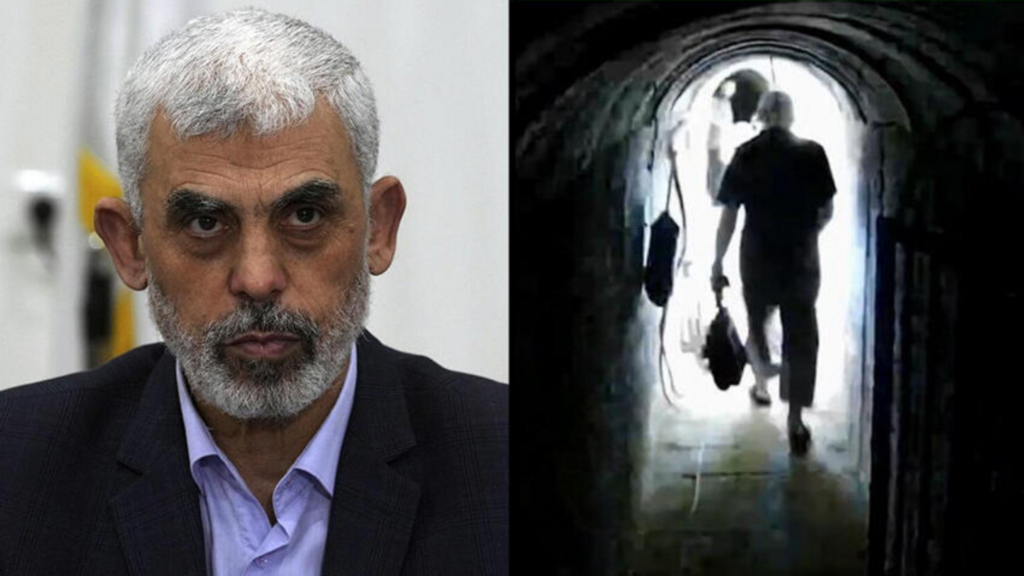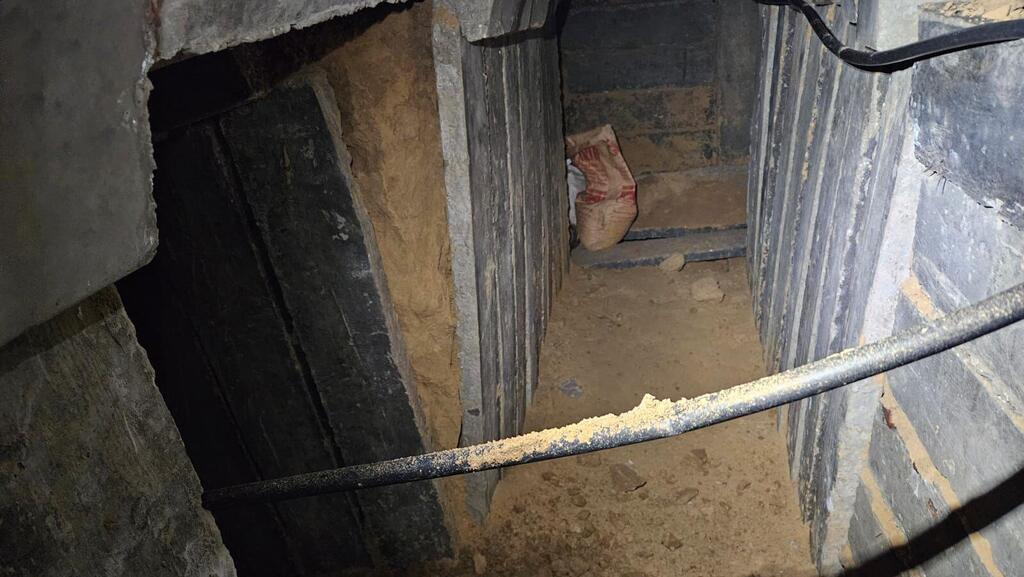Getting your Trinity Audio player ready...
An extensive article published on Monday detailed the secretive communication methods used by Hamas leader Yahya Sinwar, who has managed to evade Israeli intelligence and the IDF’s pursuit for more than 11 months.
Sinwar continues to communicate with the outside world without revealing his location in Gaza’s tunnel network, and developed methods during his time in Israeli prison, relying on a complex network of encrypted messages delivered by couriers, sometimes involving civilians, not just members of Hamas, according to The Wall Street Journal.
Israel, with significant U.S. support, has invested vast resources in its efforts to locate and eliminate the architect of the deadly October 7 terror attacks. Despite Israel's operational control over large parts of Gaza and numerous underground battles, Sinwar remains one step ahead of his pursuers. Although reports suggest Sinwar initially used electronic communication methods at the start of the war, he has since reportedly abandoned them, according to intermediaries involved in negotiations between Hamas and Israel.
Intermediaries told the Wall Street Journal that Sinwar’s typical messages are now handwritten and initially delivered by a trusted Hamas operative. The message is then passed through a series of couriers, sometimes civilians. These messages are often coded, with encryption varying depending on the recipient, the context, or the timing. Eventually, the message may reach Arab mediators entering Gaza or another Hamas operative, who may use a phone or other means to relay it to Hamas members abroad.
Voice messages and notes hidden in bread
Sinwar, the report says, has hardened his communication methods in response to the targeted killings of senior Hamas and Hezbollah figures since the war began. The turning point for Sinwar was reportedly the January 2 assassination of senior Hamas leader Saleh al-Arouri in Beirut. According to Arab intermediaries who spoke with the Wall Street Journal, after al-Arouri’s death, Sinwar shifted almost entirely to using written or verbal messages. He has also distributed voice messages through a small circle of trusted associates.
These covert communication methods reportedly stem from a system Sinwar developed while in Israeli prison, from which he was released in the 2011 Gilad Shalit deal. Before his 1988 arrest and subsequent imprisonment, Sinwar founded Hamas' internal intelligence unit, Majd, which was responsible for executing suspected collaborators with Israel and also operated within the prison. According to Mosab Hassan Yousef, the son of a senior Hamas official who became a Shin Bet agent known as "The Green Prince," the Majd unit recruited prisoners, referred to as "Sawad" (Arabic for "the hand of truth"), to disseminate written messages between different prison wings. These operatives would wrap notes inside pieces of bread, roll them into balls, let them dry and harden, then toss them between wings, shouting, "Mail from the freedom fighters!"
Despite relying on non-electronic methods to evade Israeli intelligence – methods that slow down response times – Sinwar still manages to communicate with the outside world swiftly, sometimes even in real time. For example, during negotiations in Doha last June, Sinwar reportedly relayed messages in real time. According to Arab intermediaries, CIA Director William Burns met with Qatari Prime Minister Mohammed Al Thani and Egyptian Intelligence Chief Abbas Kamel. They then met with Hamas political bureau chief Ismail Haniyeh, pressing the group to accept a hostage deal under threat of sanctions and arrests.
The mystery: How does Sinwar communicate in real time?
During these talks, Sinwar reportedly conveyed messages in real-time, with Hamas refusing to agree to a deal unless Israel committed in writing to a full cease-fire. The Wall Street Journal notes that it's unclear how he transmitted these real-time messages.
Another example was a condolence letter Sinwar sent to Haniyeh after three of his sons were killed in Gaza in April (months before Haniyeh was killed in July, after which Sinwar took over as head of the political bureau). According to the report, that letter reached Haniyeh within hours of his sons' deaths. Yet, in other cases, even at critical negotiation points, contact with Sinwar has been impossible. It remains unclear whether these delays are a negotiation tactic or a result of his complex communication methods.
The Wall Street Journal also reports about a landline network established by Hamas in Gaza’s underground tunnel city, though it’s unclear if Sinwar still uses this method. Nonetheless, he has occasionally arranged phone calls with intermediaries through this network, using code words and aliases to schedule exact times for conversations. Sinwar reportedly sometimes used the names of people he met in Israeli prison to mask his identity.
"I’m fairly certain this is one of the main reasons the IDF hasn’t found him," Dr. Michael Milshtein, head of the Palestinian Studies Forum at the Moshe Dayan Center, said about Sinwar’s careful communication patterns. "He maintains extremely strict personal behavioral habits." But despite his caution, even a small mistake could reveal his location. "The moment he slips up for even a second, it could seal his fate," said Thomas Withington, an electronic warfare expert at the British research institute RUSI.
Sinwar’s letter to the Houthis: 'We’re ready for a long battle'
This report comes after senior Hamas official Osama Hamdan said Sunday that Sinwar would "soon send a message to the Palestinian people and the world." It’s unclear if this was the message Hamdan referred to, but on Monday afternoon, Sinwar sent a letter to Houthi leader Abdul-Malik al-Houthi. According to the Houthi-aligned Al-Masirah channel, the Yemeni leader received a "special message" from Sinwar, a day after a ballistic missile launched by the Houthis was partially intercepted over Israel. "I’m happy to write you this letter on the anniversary of the Prophet Muhammad’s birth while we’re fighting together in this blessed battle," Sinwar wrote in his letter to al-Houthi. "I congratulate you on your missiles reaching deep into Israel, bypassing all its defense and interception systems. Your action restored the impact of the fight on Tel Aviv. It sent a message to the enemy that its defenses have failed, and the support fronts are making a difference."
Sinwar added, in the letter published by Al-Masirah: "I send my blessings to the Yemeni people. I assure you that the resistance is doing well, and what the enemy declares is lies and psychological warfare. We are prepared to fight a long battle that will break the enemy’s political will just as it broke its military will. Our combined efforts with you and our brothers in Lebanon and Iraq will break and defeat this enemy."
Nasr al-Din Amir, a senior Houthi official, told the Palestinian Shehab news agency that the missile launched Sunday was not in retaliation for the Israeli air force’s July bombings of Hodeida port. "This is part of ongoing activities until the aggression on Gaza stops," he said. Amir also claimed that the Houthis are ready to send "hundreds of thousands of fighters" to Hezbollah "if needed."





